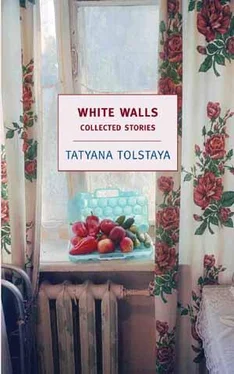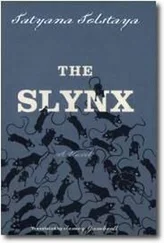This man—is blind. He has the reserved and patient face of all blind people, his eyelids are closed, his head bowed, his ear bent toward his companion. Who is she to him—daughter, wife, or simply a person hired to accompany him on his travels? He listens to her whisper and occasionally nods his head: yes yes. He wants to hear more, he puts in coin after coin. He throws coins into the darkness, and from the darkness sounds a voice that tells him, as well as possible, about the great comfort of beauty.
He listens his fill, nods, smiles, and the woman deftly wheels his chair around in the crowd and rolls him out of the mausoleum. People look at them: he doesn’t care, and she’s probably used to it. The chair bounces along the cobblestones of the square, affording the sitter a little additional suffering. A bit of rain drips from the clouds, but soon stops.
“See the other side!” But there’s nothing on the other side, on the other side there’s only darkness, heat, silence, irritation, doubt, dejection. On the other side—there’s the depiction, worn with age, of something that was important long, long ago, but not to me. “Makes you want to cry,” father wrote forty years ago of the beauty that struck him then (and perhaps about something greater). I feel like crying because he no longer exists, and I don’t know where he’s gone, and all that’s left of him is a mountain of papers and this postcard with the green heaven, which I move from volume to volume like a bookmark.
But maybe that is not the way things are, maybe everything was calculated long, long ago, everything has gone according to plan, and only now has the plan taken effect? An anonymous Byzantine master, inspired by faith, imagined the beauty of the Lord’s garden. He expressed it in his language as well as he could, maybe he was even frustrated that he didn’t have the skill to do more. Centuries passed, my father arrived in Ravenna, lifted his head, saw the vision of Eden, bought a cheap little picture of the picture, and sent it to me with love fortified by exclamation marks—everyone chooses their own language. And if he hadn’t sent it, I wouldn’t have come here, I wouldn’t have visited the dark chapel, I wouldn’t have encountered the blind man, I wouldn’t have seen how, with a wave of his hand, the blue light of heaven’s threshold flares on the other side of the darkness.
Because we are just as blind, no, we’re a thousand times blinder than that old man in the wheelchair. We hear whispers but we plug our ears, we are shown but we turn away. We have no faith: we’re afraid to believe because we’re afraid that we’ll be deceived. We are certain that we are in the tomb. We are certain that there’s nothing in the dark. There can’t be anything in the dark.
They move away down the narrow streets of the small, dead town, and the woman pushes the chair and says something, leaning over toward the blind man’s ear, and she probably falters, and she chooses her words, words I would never choose. He laughs at something and she straightens his collar, adds coins to the box on his lap, then goes into a taverna and brings him out a piece of pizza. He eats gratefully, messily, his hand touching the invisible, marvelous food in the darkness.
Translated by Jamey Gambrell
THIS IS A NEW YORK REVIEW BOOK
PUBLISHED BY THE NEW YORK REVIEW OF BOOKS
1755 Broadway, New York, NY 10019
www.nyrb.com
Copyright © 1987,1991, 2006, 2007 by Tatyana Tolstaya
Translations copyrighted as follows: “Loves Me, Loves Me Not,” “Okkcrvil River,” “Sweet Shura,” “On the Golden Porch,” “Hunting the Wooly Mammoth,” “The Circle,” “A Clean Sheet,” “Date with a Bird,” “Sweet Dreams, Son,” “Sonya,” “The Fakir,” and “Peters” © 1990; “Fire and Dust” copyright © 1986, “Sleepwalker in a Fog,” “Serafim,” “The Moon Came Out,” “Night,” “Heavenly Flame,” “Most Beloved,” “The Poet and the Muse,” “Limpopo” © 1991, “Yorick” © 2006, “White Walls” © 2000, and “See the Other Side” © 2007 by Jamey Gambrell
Library of Congress Cataloging-in-Publication Data
Tolstaia, Tat’iana, 1951 May 3-
[Short stories. English. Selections]
White walls : collected stories / by Tatyana Tolstaya ; translated by Antonina W. Bouis and Jamey Gambrell.
p. cm. — (New York Review Books classics)
ISBN-13: 978-1-59017-197-4 (alk. paper)
ISBN-10: 1-59017-197-7 (alk. paper)
1. Tolstaia, Tat’iana, 1951 May 3– —Translations into English.
I. Gambrell, Jamey. II. Bouis, Antonina W. III. Title.
PG3489.0476A2 2007
891.7344—dc22
2007005450
ISBN 978-1-59017-197-4
Printed in the United States of America on acid-free paper.
10 9 8 7 6 5 4 3 2 1












